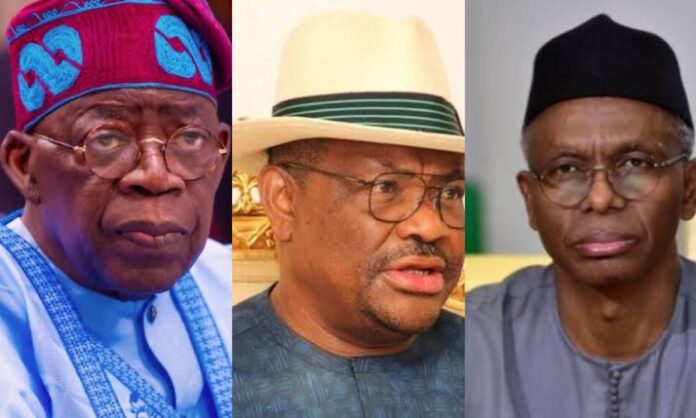In Nigeria’s political theatre, some actors remain behind the curtain, unseen, but profoundly influential.
These are the godfathers: men who pull strings, shape destinies, and influence policy without always holding public office.
As of 2025, these power brokers continue to define the country’s democratic and electoral landscape. Here’s a rundown of the ten most powerful political godfathers in Nigeria today:
1. Bola Ahmed Tinubu – The Kingmaker Turned King
Once regarded solely as the political oracle of the South-West, Tinubu now commands the entire nation as President.
Yet, he remains the archetypal godfather—strategic, calculating, and ever in control of the political machinery in Lagos, Ogun, Osun, and beyond.
His influence birthed governors, senators, and ministers. Even as he occupies Aso Rock, his grip on the APC structure remains ironclad.
—
2. Nyesom Wike – The River that Flows Beyond Rivers
The former Rivers State governor and current Minister of the FCT, Wike, has evolved into a cross-regional power broker.
His ability to sway PDP decisions, even when he operates from a federal cabinet position under an APC-led government, makes him one of the most enigmatic and potent political forces today.
His coalition-building during the 2023 elections cemented his place as a godfather not just in Rivers but also in the national opposition space.
3. Atiku Abubakar – The Relentless Strategist
Despite repeated presidential losses, Atiku remains one of the most deeply connected figures in Nigerian politics.
His vast financial muscle, network of loyalists, and influence in the PDP, especially in the North-East and North-West, make him a perennial political heavyweight.
He continues to shape who gets what in party structures, even as he prepares for what could be his final major electoral outing.
4. Abdullahi Adamu – The Quiet Northern Chessmaster
Until recently, the APC National Chairman, Adamu’s fingerprints remained across the party’s internal power structure.
A former governor and senator, he maintains deep networks within the conservative North-Central and broader Northern establishment.
Though soft-spoken, his influence often determines candidates and electoral outcomes behind closed doors.
5. Nasir El-Rufai – The Intellectual Enforcer
El-Rufai’s political clout stretches far beyond his governorship of Kaduna State. A technocrat with ideological grounding and a loyal base of northern elites and younger politicians.
His recent battles with political parties, religious groups and federal authorities only added to his mythos as a fearless political godfather with ambitions that may resurface.
6. Bukola Saraki – The Comeback Maestro
Once Senate President and a master of legislative politics, Saraki’s political influence waned post-2019 but has quietly rebounded.
With roots in Kwara’s political dynasty and deep connections across the PDP, Saraki remains a key godfather in the North-Central.
His ability to mobilise resources, build coalitions, and broker peace among factions keeps him relevant.
7. Rabiu Musa Kwankwaso – The Red-Capped General
Kwankwaso leads more than a movement; he commands a political cult. The Kwankwasiyya structure gives him unfiltered control over Kano politics and a say in national affairs.
His New Nigeria Peoples Party (NNPP) proved a surprise force in 2023, winning Kano State and disrupting the northern political equation.
Kwankwaso’s ideological grounding and youth-focused messaging make him a different breed of godfather, one with grassroots legitimacy.
8. David Umahi – The Bridge Between Regions
The former Ebonyi governor and current Minister of Works has subtly built himself into a cross-party influencer.
From his days in the PDP to his high-profile defection to the APC, Umahi has played both sides of the aisle with surgical precision. In the Southeast, he’s one of the few leaders seen as wielding real federal influence.
9. Abdullahi Ganduje – The APC’s Power Broker-in-Chief
From Kano State governor to the current National Chairman of the All Progressives Congress (APC), Ganduje has firmly entrenched himself as a northern political godfather with national reach.
Despite past controversies, he has manoeuvred through power shifts with resilience, commanding loyalty from key northern stakeholders and maintaining influence over Kano’s volatile political landscape.
As APC chairman, he plays a central role in determining party candidates and negotiating alliances, making him a kingmaker both within and outside the North-West.
10. Aliyu Wamakko – The Sultan of Sokoto Politics
Though not as nationally known as others, Wamakko is a silent but significant godfather in the North-West, especially in Sokoto and Zamfara politics.
As a former governor, senator, and elder statesman within the APC, his endorsement carries weight in elections and appointments in the region.
Conclusion
Nigeria’s democracy may thrive on ballots and campaigns, but godfatherism remains its beating heart.
These ten men are not just influencers, they are the architects of political destinies, the silent referees in Nigeria’s loudest political matches.
As 2027 looms, their power will either be tested, challenged, or reinforced, but never ignored.

